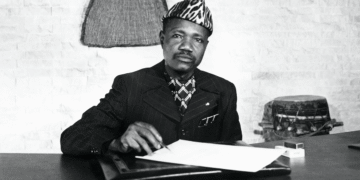V. Y. Mudimbe (full name: Valentin-Yves Mudimbe) was one of the most prominent African thinkers of the twentieth century and a pivotal figure in postcolonial studies, philosophical anthropology, and the understanding of the mechanisms of knowledge construction about Africa. Mudimbe was particularly known for his works that deconstruct the “Western imagination” of Africa and demonstrate how the continent and its knowledge have been “invented” through colonial, missionary, and anthropological lenses. His legacy spans philosophy, literary criticism, linguistics, and history, making him an essential reference for anyone seeking to understand the complexities of the relationship between knowledge and power in the African context.
Mudimbe was born in 1941 in Belgian Congo (now the Democratic Republic of the Congo). He grew up in a turbulent period in Congo’s history, encompassing pre-independence, Belgian colonialism, and post-independence conflicts. These early experiences instilled in him a profound awareness of the complexities of identity, power, and the impact of colonialism on the structure of society and thought.
Mudimbe received his early education in missionary schools in the Congo, where he emerged as a gifted student. He pursued his higher education in Europe, studying at the University of Louvain, Belgium, where he earned a doctorate in philosophy. This rigorous academic training in Western philosophy, coupled with his African background, provided him with a unique perspective on the intersection of cultures and knowledge systems. He was not simply a recipient of Western knowledge but a critical thinker seeking to deconstruct its presuppositions and their influence on understanding Africa.
Mudimbe has worked at several prestigious universities around the world, including the University of Louvain, the University of Paris, Stanford University, and Duke University in the United States, where he held the William R. Kenan Jr. Chair in Romance Languages and Literatures and was Director of the Center for African and Intersectional Studies.
Mudimbe’s central intellectual project, exemplified in his most famous book, is to analyze how knowledge about Africa has been constructed and, consequently, how the continent has been “invented” in Western consciousness. Mudimbe argues that this invention was not merely a misunderstanding but rather an active process of interpretation, classification, and domination that led to the formation of certain perceptions of Africa and its peoples.
In “The Invention of Africa: Gnosis, Philosophy, and the Order of Knowledge” (1988), Mudimbe’s most influential and intellectual masterpiece, he traced the history of African “gnosis,” that is, African ways of knowing and understanding, and how these have been replaced or distorted by Western epistemological systems. Mudimbe argued that colonial, missionary, anthropological, and political ideologies contributed to the construction of an African “Order of Knowledge” that did not reflect African reality but instead served the interests of the dominant powers.
Mudimbe in the book also criticized Western anthropology for its role in categorizing African peoples, freezing their cultures into “primitive” images, and presenting them as “objects” of study rather than as “subjects” producing knowledge. Also, he analyzed how the missionary project, despite its positive aspects in spreading education, also contributed to the reshaping of African identities and the imposition of Western intellectual frameworks. Mudimbe used the tools of philosophical and linguistic analysis to deconstruct Western discourses about Africa, revealing how they constructed concepts such as “primitiveness,” “savagery,” and “ahistoricity” to justify colonialism and domination. The main conclusion of the book is that “Africa,” as we understand it today (with its concepts, categories, and written history), is largely the product of Western “invention,” not mere discovery. This does not mean that the continent does not exist, but rather that the ways it is understood and represented have been shaped from outside.
In his book “The Idea of Africa: African Philosophy, The Order of Things, and The Order of Signs” (1994), Mudimbe continued his exploration of ideas about “Africa” itself and how these ideas have evolved. He focused on the development of African thought, its challenges, and how African philosophers can reconstruct their own “knowledge system” free from colonial influences. He explored the question of whether there is an authentic “African philosophy” and how it can be defined and developed in a global context.
In his work “On African Library” (1996), Mudimbe addressed the relationship between written knowledge and power, exploring how Western libraries and knowledge institutions have influenced the construction of African history and culture. He discussed the challenges of constructing an authentic “African library” that reflects the diversity and richness of African thought, free from Western classifications and biases.
Mudimbe’s thought was considered complex and profound, drawing inspiration from structuralist and post-structuralist philosophy, particularly Michel Foucault’s ideas on knowledge and power. Influenced by Foucault, Mudimbe analyzed the “layers” of knowledge about Africa, how this knowledge was constructed across different historical periods, and the rules and assumptions that governed it. Besides, Mudimbe focused on the nature of knowledge about Africa, its sources, scope, and how it was validated and justified, and how these processes were often linked to colonial power. He referred to the “liminalities,” or in-between spaces in which African intellectuals exist, between African and Western cultural worlds, and how these spaces can be a source of creativity and critical thinking.
Mudimbe was not only a philosopher and scholar but also a distinguished writer. He wrote novels and poetry collections in French to deconstruct Western ideas from within. His literary works often explore themes of identity, alienation, returning to African roots, and existential challenges in a postcolonial world.
In “Les Écarts” (1989), his novel, which demonstrates the influence of his philosophy on his literary work, addresses issues of cultural and intellectual alienation. “L’Écart” (1979) is a literary exploration of the contradictions and internal conflicts of African characters in the face of modernity and tradition.
His literary works demonstrate his profound awareness of the aesthetics of language and its power to shape thought and consciousness. He believed that literature and philosophy were not separate but rather interacted in constructing global understanding.
V. Y. Mudimbe passed away in North Carolina, United States, on 22 April 2025, at the age of 83, leaving behind a tremendous intellectual legacy that continues to be studied and inspire researchers in multiple fields.


























































